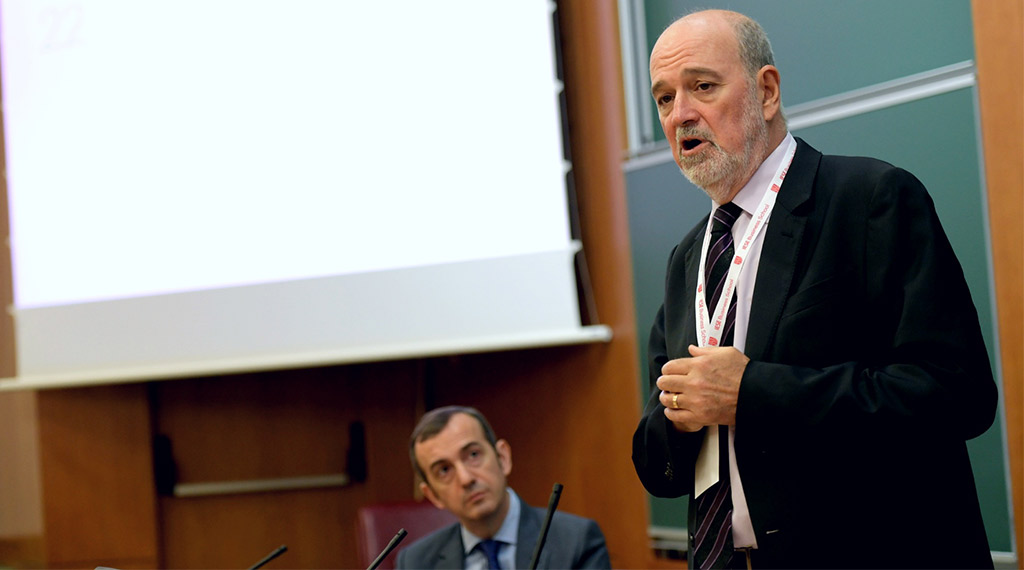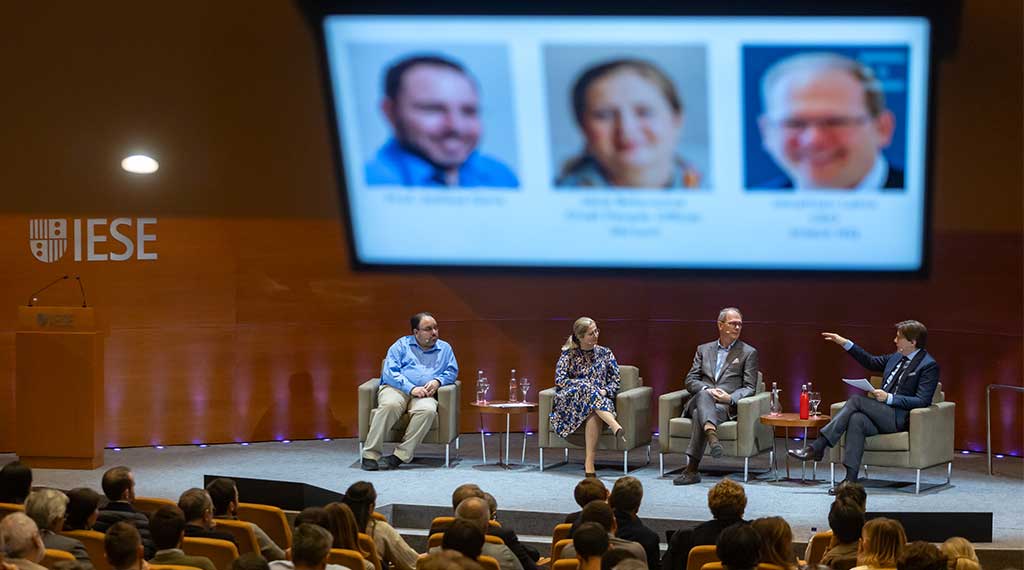Stories
Artificial intelligence : For businesses, great potential and great risks
22 Digital Ecosystem in Madrid looks at generating value through AI
Professors Javier Zamora and Joan Ricart were academic directors of the 22 Digital Ecosystem in Madrid.
Photo: Javier Arias
October 10, 2019

For all its potential to transform business, artificial intelligence will also force companies to deal with new issues ranging from the ethical and legal to the organizational and operational.
IESE’s 22 Digital Ecosystem, held this week on the Madrid campus, looked at the many challenges companies will encounter as they bring AI into their operations. Professors Joan E. Ricart and Javier Zamora served as academic directors of the meeting, which had Penteo as a supporting company.
The event brought together executives and experts from the sector such as Lourdes de la Sota, SEAT’s VX Customer Journey director; Pere Nebot, CIO of CaixaBank; Bosco Aranguren, Vodafone’s head of Digital Channels; Elena Gil, CEO of LUCA, Telefónica’s data unit; Jesús Villacorta, director of Strategy & New Ventures at Orange Spain; and Pedro Esquivias, chief customer officer of Tendam Global Fashion Retail.
The executives and experts identified the following areas of risk:
Bias. “If the reality is racist, sexist and classist, it is most likely that our artificial intelligence, if we’re not very careful, will be too,” CaixaBank’s Nebot warned.
“There is an obvious tension between the personalization of the product, the privacy of the user and the fair treatment users should receive,” added Richard Benjamins, Telefónica’s ambassador of Data and AI. For example: “To realize that my algorithm is discriminating based on race and correct for that, I need first to know the race of my users … and to adapt my products more and more to their needs, I will have to know them better and better.”
Legal frameworks. Carmen Mateas, founding partner of Mateas Lawyers, recalled that, beyond limitations and ethical dilemmas, European AI has to live with a rigorous legal framework for data protection that includes “not only human decisions, but also automatic decisions made by algorithms.”
At the same time, she noted that European antitrust officials are already investigating whether data encourages the dominant position of a company, whether Amazon or Google search engines or recommendations give preference to their own products, and whether the platforms are transparent with their business users.
Officials are also very vigilant of competing companies coordinating algorithms to favor concentration or manipulate prices.
Cybersecurity. “Artificial intelligence, which is going to be developed especially with 5G networks, will mean connecting millions of things to the internet, which means there will be more entry ways for the bad guys,” said Carlos Gavilanes, who handles Industry Strategy at GSMA. Basically, new means will emerge to protect infrastructures through machine learning, but there will also be more fault lines.
Organizational structures. AI also presents strong organizational challenges. According to Tendam’s Esquivias, “Data scientists do not usually take into account that their models must be geared toward selling more and, many times, companies need to create the figure of ‘translator,’ who can explain in clear language the main characteristics of these models to other departments.”
The executive also stressed the limitations of AI in resolving the main existential problems facing retailers. Omnichannel retailing is still extremely expensive and complex, and it is not clear that technology and algorithms will ever replace the efficiency and quality of human salespeople in physical stores. SEAT’s De la Sota said neither AI nor other technologies reduced the strategic weight of the carmaker’s network of dealers across Europe, which are one of its main points of interaction and, therefore, sources of customer data.
IESE’s Zamora highlighted that it is not enough to incorporate cutting-edge technology such as AI into companies without making other changes. To convert the data into value or competitive advantage, companies must attract the right talent, train their employees workforce and promote a data-smart corporate culture. “We cannot change the beliefs of our professionals,” he warned, “but we can change their behaviors so that, in the long term, their beliefs also change.”
“Companies must take a holistic approach to their digital transformation,” Zamora added.


